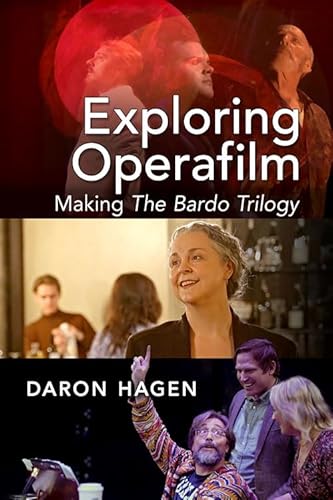From the Preface:
From the Preface
Operafilm is a neo-Gesamtkunstwerk form of opera cinema where every sound heard on the soundtrack (including sound effects, music, dialogue, and the various methods of performing and creating sound), every image seen on the screen (including staging, framing, superimposition, lighting, imagery, and the style and pace of editing), and every mode of performance (including acting style, vocal style, narrative style, analogue or digital performance, live or pre-recorded, improvised, or memorized) is coordinated, determined by the auteur vision of a single composer-screenwriter / librettist-director-editor in order to reflect the internal motivations of the narrative.
By way of giving an idea of my weltanschauung, I begin with a very general appreciation of opera’s role as I see it in mainstream western cinema since the beginning of the 20th century, continue with a quick sketch of my training as a composer, director, and filmmaker, and then use three films, collectively called The Bardo Trilogy to discuss different aspects of operafilm’s implementation.
My thinking leans into Lev Kuleshov’s explanation of montage as it relates to Nicolai Rimsky-Korsakov’s Principals of Orchestration. Conversations during spring 1996 with Benjamin Boretz about “how to hear” the “spatial counterpoint” of Edgard Varèse directly shaped the way that I conceive of the interjecting of static shots into arc shots. A conversation with Ford Mylius Lallerstedt in 1998 about the specific ways that the physical space of the Basilica di San Marco in Venice, Italy shaped Claudio Monteverdi’s counterpoint and how that effect might be reproduced visually has remained central to the way that I both “hear” film and “see” music ever since. Gian Carlo Menotti’s wisdom regarding the intertwining roles of the composer, librettist, and director have been mantra for me for forty years.
I am not offering up operafilm as an avenue of creative inquiry as the best way or as the only way to move forward in the combining of cinema and opera. Nor am I making the case that it hasn’t already been achieved in any number of ways in the past. It has, but not all at once and not all the way through a film: the technology was either not yet invented, or it was too expensive, or it was done with so little regard for the middlebrow that it never landed in the mainstream. I am sharing my excitement at having discovered a mode of expression that activates all the facets of my imagination at once. It enables me as a composer not just to compose sound, but space.
Following the three “making of” essays are, in language familiar to cineastes, the screenplays for the films themselves: Orson Rehearsed, 9/10: Love Before the Fall, and I Hear America Singing, all of which may be viewed on Amazon Prime Video and other streaming providers worldwide.
Daron Hagen
Format: softcover (6 x 9)
Pages: 260
Bibliographic Info: ca. 5 photos, bibliography, index
Copyright Date: 2025
pISBN: 978-1-4766-9956-1
eISBN: 978-1-4766-5807-0
Imprint: McFarland
“A spectacular plea for operafilms, Exploring Operafilm—just the sort of memoir-essay I like about how one works, makes, and creates. …and using the notion of auteurism to re-situate the creative process from the ‘book’ writer to the composer driven and directed total film.”—Craig Saper, Professor of the Language, Literacy, and Culture Doctoral Program, UMBC, Baltimore, Maryland
“This majestic volume deeply explores the exciting new form called operafilm by its original practitioner. It combines the visual and musical vocabulary of opera, drama, and film in profound and original ways. Hagen reveals the deep and literate relationships, sometimes spanning across decades, that bring together every element of his operafilms—even, for instance, a paragraph where Schoenberg’s string quartets are related to Madonna’s ‘Like A Virgin.’ The prose is both rich with detail and conversational, and it is a fascinating read.”—David Rakowski, Walter W. Naumburg Professor of Composition, Brandeis University
“Hagen moves energetically from a spot on appraisal of Angelo Badalamenti’s importance in shaping the operatic visions of David Lynch to hands on advice about how a film composer navigates post production in a book that is bound to engage filmmakers and composers of all kinds, as well as cinephiles and film theorists.”—Miles Hankins, film composer and producer, A Quiet Place, Long Shot, and Burn Notice


